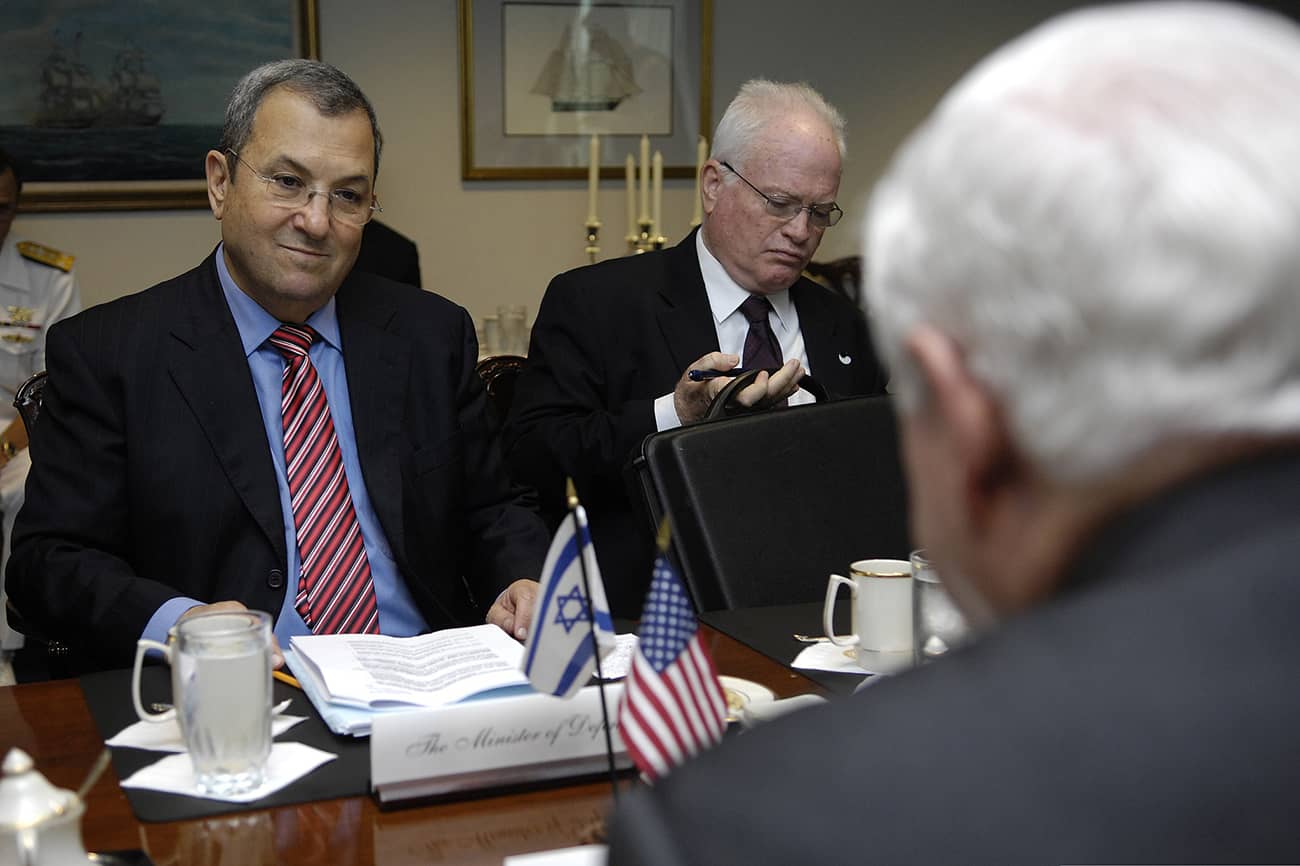Warning Lights, Secret Talks with Amos Gilead,1 by Shimon Shiffer. Yedioth Ahronoth, 2019.
It has been twenty years now since I left military service, having served several years as General Amos Gilead’s “assistant for assessments,” (i.e., his deputy for political and strategic analysis). One pithy dictum that we hung on the walls in some of our offices still lingers in my mind. “Soldiers of the Directorate of Military Intelligence, the people of Israel expect from you good news soon. And bad news—in time.”
No one represents the verity of this need for early warning (hatra’ah, in Hebrew), in the full sense of the word, better than Amos Gilead, who served in the Directorate of Military Intelligence (DMI) until 2001. He went on to become the head of the Coordination of Government Activities in the Territories and then the highly influential director of the politico-military wing of the Ministry of Defense, the counterpart of the US Defense Department’s under secretary for policy. This is a book of conversations with him, each one recorded and prefaced with some comments by one of Israel’s best known journalists, Shimon Shiffer. It delves into some of the most profound—and troubling—issues in modern Israeli history through the personal perspective of a man who was in the room where decisions were made again and again. He came armed with an intelligence officer’s powers of observation and analysis, and with an unwavering moral compass; Shiffer, a friend, lends him a sympathetic ear.
Currently unavailable in English, this is a key primary source for any attempt to understand Israeli policy in the last 40 years. Many of the themes that emerge are closely related to the questions and challenges discussed in other essays and columns in the present issue of The Jerusalem Strategic Tribune; but Gilead’s historical perspective adds punch and poignance to the message.
To begin with—although the book starts with Israel’s Lebanese tragedy 14 years earlier—Gilead takes credit, justifiably so, for the annual national intelligence assessment of 1996, rewritten in his own emphatic style within days after he took over as head of the Research Division from General Yaakov Amidror. For the first time, and amidst many other challenges, this document forcefully stated that the Islamist revolutionary regime in Iran had positioned itself as Israel’s most significant enemy. The young, newly elected prime minister, Benjamin Netanyahu, asked Gilead to see him soon afterwards and informed him that he had endorsed and internalized the implications of this analysis. This set in motion, in turn, a course of action—both diplomatic and covert—that has remained central to Israeli policy for a full generation since then, as evidenced most recently by Prime Minister Bennett’s September 2021 speech at the UN General Assembly.
Gilead’s existential dread regarding Iran reflects a broader fear of radical ideologies, particularly those that ignite and feed upon religious fervor and leave no room for real compromises (as distinct from short-term tactical withdrawals). He is bluntly dismissive of those in Israel and in the West, who somehow persuade themselves that such people and movements really want a good normal life like all of us: No, they do not. To him, it is a travesty to try and dismiss the commitment of the present Iranian regime to the obliteration of Israel, or the danger inherent in the rise of the Muslim Brotherhood in a key country such as Egypt. Hence his severe criticism of aspects of President Barack Obama’s policies— albeit tempered with an equally angry attack on those in Israel who made their noisy quarrel with the US administration a matter of public record.
Gilead is not infallible, nor does he claim to be. The one point on which Shiffer challenges him is his public assessment in early 2003—prior to the American invasion of Iraq—that Saddam Hussein did hide immense and dangerous capabilities, which the fall of his regime would reveal. His response is that he was no longer an intelligence officer, and his predictions rested upon the assessment of practically every intelligence service in the West: We now know that Saddam was busy hiding the fact that he no longer had anything to hide.
Closer to our day—the book was published in 2019—Gilead at several points casts doubts about the prospect of any Arab countries beyond Egypt and Jordan crossing the threshold of peace with Israel without a prior breakthrough with the Palestinians, which is what happened a year later with the Abraham Accords, contrary to his expectations. As he points out more than once, intelligence assessments, and any attempt to read the developments in a region as complex and dynamic as ours, need to be constantly re-evaluated: Being right repeatedly can make you blind to your own mistakes, as happened to some of the key analysts of the DMI in looking at Egypt’s actions in the run-up to the 1973 war.
Still, a combination of firm principles, a keen reading of the evidence and powerful personal intuitions—and the book is replete with illustrations of all three, particularly the latter—can lead to the right assessments and the right decisions. Gilead is a firm, unwavering supporter of the “Begin Doctrine,” announced in 1981 as an explanation of the raid of the Israeli Air Force on the Iraqi nuclear facility, OSIRAK. He was intimately involved in aspects of the decision in 2007 to destroy the North Korean-built nuclear facility in Syria (and then, equally wisely to keep officially silent about it for years until the exposure in 2018, which he thinks was a mistake). He offers criticism of the almost-open dispute between Netanyahu and the defense establishment over the military option in Iran in 2010, and he clearly believes—as do others in this issue of the JST—that far-reaching measures are necessary to stop Iran in its present nuclear tracks.
On the matter of frankly assessing the capabilities and intentions of one’s allies, the book offers a stark story regarding Israel’s Maronite partners in Lebanon in 1982. Gilead, working closely with them, came to dislike them intensely and to doubt their every word (and even more so, their claimed strength). Later, his blunt and bitter warning against letting them into the Sabra and Shatilah refugee camps, after the assassination of Bashir Gemayel in September 1982, made him both the star witness of the national commission of inquiry which investigated the massacre there as well as the enemy of powerful people in the defense establishment, who sought to destroy his credibility and his career. This chapter, which opens the book, is not a pleasant read, but it provides striking insight into the dynamics of delusion leading to outcomes such as that experienced by Israel in Lebanon (and the US in Afghanistan and Iraq).

Fatah supporters rally in Gaza, December 2000. Photo credit: Reuters
Personal intuitions, gut likes, and dislikes are ultimately part of this story no less than the careful reading of the immense piles of incoming traffic from the collection agencies. Twice—in 1983, and even more dramatically in 1996—Gilead saved Israel from an unnecessary war due to his innate sense of the thinking of Hafez al-Asad—the risk-averse father, and not his reckless son who now rules and ruins Syria. In the latter case, this led to the incredible exposure of one of the Mossad’s key agent runners—Yehuda Gil—as a total fraud, who invented detailed reports of an impending offensive presumably obtained from a Syrian general, whom he had never actually recruited (Gil consequently admitted and was sentenced to several years in jail).
A similar combination of careful analysis and moral revulsion (acutely aware of the Jewish people’s tragic history, Gilead fiercely resents unrepentant terrorist murderers) led him to doubt Yasser Arafat’s intentions, even in the heyday of the Oslo process. In 2000, both he and I warned that Arafat would seek a violent confrontation, which became all the more likely after the failure of the Camp David summit. As the violence indeed unfolded in the autumn of 2000, Gilead was convinced, confirmed by the evidence, that this was no intifada—uprising from below—but a terror campaign directed from above.
This distrust and dislike of Arafat does not translate, however, into a rejection of the two-state solution, which Gilead still sees as vital to Israel’s future as a Jewish and democratic nation nor into a breach with other Palestinian leaders. With President Mahmoud Abbas (Abu Mazen), Gilead built a cordial relationship, after he intervened as head of the Coordination of Government Activities in the Territories to ensure that Abu Mazen’s son, who died of natural causes in the Gulf, could be brought to burial in Ramallah. In the debate on these pages as to the prospects for a diplomatic solution to the Israeli–Palestinian conflict, Gilead would probably side with General Jones on the urgent need for it and with Dan Schueftan on the utter unlikelihood of a breakthrough.
Meanwhile, as he forcefully argues, it is absolutely vital to sustain good relations with both Egypt and Jordan. It has been a persistent aspect of Israel’s policy in the region that day-to-day relations with both Cairo and Amman are largely managed—to the occasional dismay of both the Foreign Ministry and the Prime Minister’s Office—through Ministry of Defense channels. In practice, this made Gilead (and Zohar Palti, his successor in the policy wing of the Ministry of Defense) into one of Israel’s most important diplomatic agents. He recounts the manner in which relations were built over the years with commanders and leaders in both countries, including Egypt’s current president, Abd al-Fattah al-Sisi; no friend of Israel in his early years, al-Sisi learned to appreciate (as recently demonstrated) how important this relationship can be for the future of his country. Not surprisingly, Gilead quite bluntly argues that such leadership in the Arab world is preferable to a democratic experimentation that would merely pave the way—as with Hamas in 2006—to dominance by Islamist radicals who are not democrats at all.
One of the poignant moments of the book is his recollection of a lunch with an old but formidable Jordanian general—“91, but looking 50”— over kebabs in Tel Aviv, as they set down to discuss the desperate and bloody fight for Jerusalem in 1948 (when his interlocutor commanded the artillery that shelled the city) and all that has happened since. Gilead, not a religious man, still admits a sense of the miraculous to such moments. I can personally attest to that. My late father, Israel Lerman, had been among the fighters in the Old City of Jerusalem and later a PoW in Jordan for nine months. Seeing him sit for a conversation with my personal friend, the Jordanian Ambassador to Israel, at my daughter’s wedding in 2014 conveyed much the same sense of elation.
Strangely, the book concludes with an unrelated document by another prominent Israeli, the late Major General Avraham (Abrasha) Tamir, who, as director general of the Foreign Ministry, was secretly sent by Shimon Peres in 1987 to meet first Arafat in Maputo, Mozambique, and then King Hussein of Jordan in a mountain chalet in Switzerland. Neither mission produced a breakthrough, but perhaps Shiffer saw fit to bring Tamir’s overly optimistic text, verbatim, so as to counter-balance Gilead’s pessimism about peace. This artificial adjunct detracts from the main theme of an otherwise excellent read, about the impact that a perspicacious intelligence officer had on his country’s fortunes in peace and war.
1 Ha-Matri’ah: Sihot im ha-Aluf (bemil.) Amos Gilead. The publisher offers as an English title “Warning Lights: Secret Talks with Amos Gilead,” but this does not capture the personal import of the term ha-Matri’a, “the forewarner.”

